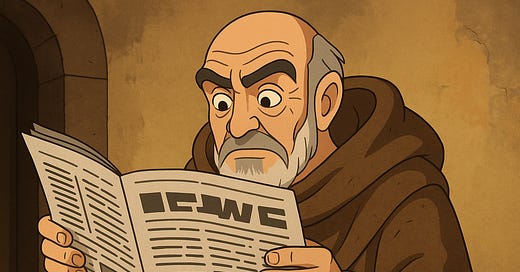The Motion, the Myth, the Multiannual Framework
While journalism scored a small but important victory in the EU budget negotiation process, a whole host of other policy battles are just beginning.
We're dangerously close to turning this newsletter into the digital equivalent of an arcane medieval compendium, except instead of powerful dark magic, we're trafficking in esoteric EU regulations and mind-numbing legislative procedures. So on one hand, in the unlikely event that this becomes the script for the long awaited “The Name of the Rose” sequel, I really hope a young Sean Connery will play me. On the other, I promise to ease up on EU bureaucracy in the coming weeks, but bear with me one last time.
Especially as I bring reasonably good news: the Budget Committee of the European Parliament has set out their priorities for the next Multiannual Financial Framework (MFF), and the final text does have strong references to media and journalism, something that was missing from the original proposal.
Today, I want to lay out what's happened so far, what this means for the ecosystem, and address some other tech policy and enforcement-related changes that may impact the European (and global) information space.
M to the F to the MF F
We've covered the EU's budget procedure and its relevance to journalism extensively in recent months, so I'll be brief with the essentials:
We need funding reform: more EU investment in journalism and the wider ecosystem, with accessible mechanisms that catalyze innovation.
As the US government and aligned institutions divest from global journalism, the EU's commitment and potential funding increase become crucial.
While some public interest journalism is vital for democracy, our advocacy must explore broader frames – journalism as an enabler of economic growth and contributor to stability.
The EU operates in seven-year budget cycles, with the next starting in 2028. Current negotiations in Brussels represent our best opportunity for positive change. These negotiations will span two years, requiring sustained effort and a broad coalition. We must engage all three key institutions: Commission, Council, and Parliament.
Most journalists (and readers) appreciate stories with compelling arcs – heroes, villains, challenges, and triumphant conclusions. Think Excalibur with Carmina Burana swelling in the background, but I'll stop with the 1980s cultural references. Success in the MFF negotiations is going to look like precisely the opposite. Let me demonstrate.
Our first "battle" victory came through the Budget Committee of the European Parliament – though calling it a battle oversells the drama. The committee adopted a "Motion for a European Parliament resolution on a revamped long-term budget for the Union in a changing world" (TRY TO CONTAIN YOUR EXCITEMENT!!!). This motion outlines priorities for the next long-term EU budget.
The original proposal barely mentioned media literacy and completely omitted journalism. Having journalism explicitly included doesn't guarantee funding, but it creates a critical reference point. We can now argue, "The Budget Committee already identified journalism as important, so these specific programs are necessary." This inclusion of strong journalism references marks an important first victory, but at the same time it’s just one small Lego brick in a complex Technic set that will take years to complete.
Despite the procedural complexity, we’re proud to have contributed to this initial win. Here's the key text:
“(...) Stresses that a free, independent and pluralistic media is a fundamental component of Europe’s resilience, safeguarding not only the free flow of information but also a democratic mindset, critical thinking and informed decision-making; points to the importance of investment in independent and investigative journalism, fact-checking initiatives, digital and media literacy and critical thinking to safeguard against disinformation, foreign information manipulation and electoral interference as part of the European Democracy Shield initiative and therefore a guarantor of democratic resilience; underscores the need for continued Union budget support for initiatives in these areas; (...)”
Not quite a cavalry charge accompanied by a grand orchestra, but it's a solid foundation to build upon.
The next formal step comes in July, when the Commission reveals the first draft of the next MFF. Between now and then, we need to ensure that decision-makers in and around the EC hear consistently about the importance of the media and information ecosystem. We can now reference the BUDG Committee's motion to demonstrate this isn't merely sectoral self-interest but aligns with the priorities of the wider European establishment.
While including journalism funding in some form in this first draft would be a significant victory, we're still at the beginning of a marathon. After publishing the first draft, the Council and the Commission will do a million rounds of negotiations about priorities and allocations, followed by discussions around specific programs, with Parliament's involvement increasing over time. This means that while our focus for the next 8-12 weeks will be on the Commission, it's worth engaging all stakeholders across the EU apparatus. At this stage, everyone essentially becomes a lobbyist up the chain to the Commission President's office, advocating for their respective priorities.
The other, more cinematic battle with Big Tech
While the incremental MFF negotiation process is super important, there is another consequential policy related battle going on in Brussels (and to a smaller extent, in the US), around the role and power of big tech. This one offers more drama and perhaps higher immediate stakes for our daily operations.
A trade war is brewing between the US and EU, with European tech regulation as a flashpoint. Since nearly all major platform companies are American, what may have begun as efforts to protect European consumers and ensure fair competition is now viewed through a geopolitical lens.US threats of tariffs in response to European tech regulation and the EU's tightening enforcement as a counter-response have become part of the same cycle.
We're already seeing concrete developments. The EU is recruiting 60+ lawyers specifically for Digital Services Act enforcement, one of the major frameworks governing big tech, while imposing fines in the hundreds of millions on companies like Meta and Apple under the Digital Markets Act. Meta's new MAGA-aligned Chief Global Affairs Officer, Joel Kaplan, has predictably characterized these fines as de facto tariffs "attempting to handicap successful American businesses" feeding directly into the political narrative.
Meanwhile, European Central Bank President Christine Lagarde speaks openly about Europe's dependence on foreign digital payment infrastructure. Though not explicitly targeting Google and Meta, she clearly advocates for sovereign European systems. Other EU policymakers share this perspective on US tech dominance, viewing it as a threat to European strategic autonomy, especially given the current hostile geopolitical climate and America's apparent retreat from the Trans-Atlantic alliance.
These forces do welcome stricter regulation and enforcement, believing that pushing back against US tech dominance will create space for European technology companies, serving both the EU's strategic and financial interests.
Since big tech disrupted the digital advertising market 15-20 years ago, a lot of journalism has faced perpetual crisis (though certainly other structural factors contribute). The question now is whether European publishers would fare better with European tech partners than with American ones, and whether tighter tech regulation generally would lead to better outcomes for media, whether through increased revenues, reach, or both.
Antitrust cases against Google and Meta are multiplying across jurisdictions. Casey Newton recently wrote in Platformer that "Google may be on the brink of a breakup" arguing that "breaking up Google's ad monopoly will be good for journalism, publishers, and the web." Meanwhile, Google sends thinly veiled messages to publishers that it could stop carrying news without suffering meaningful economic consequences.
While these battles are not directly connected to the MFF, I think they will largely play out during the same period (over the next 18-24 months) and might have serious effects on funding priorities.
Sean Connery will play neither of us
Neither the MFF negotiations nor the tech regulation battles are fundamentally about journalism. If we temporarily set aside our sector's trademark self-importance, we must acknowledge that our interests are, at best, footnotes in these larger geopolitical and economic struggles. Our voices may not even register at these negotiating tables.
Journalism's worth is not self-evident to policymakers or the public, despite how obvious it seems to some of us. This means our role in these events (beyond documenting them from the sidelines) remains an open question.
While this newsletter tends to concentrate on process, like the mechanics of MFF negotiations or the maneuvers of regulatory enforcement, there's a lot of work ahead on substance. We need compelling, evidence-based demonstrations of why journalism matters (and must adjust our journalism to matter in meaningful ways for our audiences). Only then might our perspective be considered when planning the EU's next budget or when establishing frameworks to regulate technology critical for functional public discourse.
(Barring some mega developments, I promise to not focus on EU policy too much in the next few editions, so even if you had enough, don’t unsubscribe just yet.)





